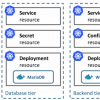kubernetes
 |
Using More Advanced Kubernetes Controllers Kubernetes is an object-oriented framework for orchestration of Docker containers. While running basic Kubernetes objects like pods and services is essential to all Kubernetes applications, what controller to use should be based on several factors. Let’s explore some advanced controller options for additional features. |
|
 |
Using Basic Kubernetes Objects Kubernetes is an object-oriented framework for orchestration of Docker containers. The Kubernetes API supports several different types of objects and provides schemas for all the objects it supports. While there are many options for different features, let’s look at some of the main Kubernetes objects and their uses. |
|
 |
Choosing Volumes for Kubernetes Storage For data storage with Kubernetes, pod-based storage is not persistent, so external storage is necessary. A volume is a directory that is accessible to all containers in the pod, and it exists as long as the pod exists. Several types of volumes are supported, so let's explore some of these Kubernetes storage options. |
|
 |
Choosing a Container Orchestration Platform with Docker Docker is the de facto container platform, supporting the microservices architecture for deploying loosely coupled applications. However, Docker supports several container orchestration platforms—which should you choose? Let’s look at some of the main platforms: Kubernetes, Docker Swarm, OpenShift, Mesos, and CFCR. |
|
 |
Should You Use a Managed Cloud Service for Kubernetes? Kubernetes is the number one container orchestration platform, as it’s suitable for deployment, scaling, and management of containerized applications. Several managed cloud-based services are available for Kubernetes, but are they right for your situation? Let’s look at the benefits and drawbacks of these services. |
|
 |
Using Kubernetes Helm Charts for Increased DevOps Collaboration A Docker image is usually designed for a baseline functionality and can then be customized. However, customized resource definitions are typically not shared among other users who might have a similar application requirement. Here’s where Helm charts for Kubernetes can help reduce rework and increase collaboration. |
|
|
|
Why Use Kubernetes for Your Container Management? Kubernetes is the most commonly used open source orchestration framework for containers. It’s used for automating deployment, scaling, and management of application containers and works with many container tools, including Docker. But what makes Kubernetes so popular? And would it be useful to you? Let's take a look. |
|
 |
Leveraging Kubernetes as a Tester Kubernetes is a scalable, production-grade container orchestration tool with automated deployment, scaling, and management capabilities. Using it shortens the feedback loop and enhances communication. Here’s how testers can leverage Kubernetes to quickly gauge application quality and speed up the delivery of value. |


